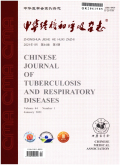顺铂单药或联合阻断型抗程序性死亡配体-1抗体对肺腺癌SPCA-1细胞及人T细胞的影响
Effect of cisplatin alone or combined with monoclonal anti-programmed death ligand-1 antibody on lung adenocarcinoma cell line SPCA-1 and T lymphocytes
摘要目的 研究顺铂单药或联合阻断型抗程序性死亡配体-1抗体(抗PD-L1)对肺腺癌SPCA-1细胞及人外周血纯化T细胞的影响,探索抗PD-L1对肺癌的治疗作用.方法 采用流式细胞术选取高表达膜型程序性死亡配体-1(PD-L1)的肺腺癌细胞株SPCA-1;采用CCK-8法确定对细胞生长抑制率≤20%的顺铂浓度(IC20);采用不同浓度顺铂对SPCA-1细胞和T细胞进行干预,CCK-8法检测细胞增殖的改变(A值),碘化丙啶染色法检测SPCA-1细胞周期及T细胞的凋亡;采用不同浓度顺铂单药或联合抗PD-L1对SPCA-1细胞和T细胞共培养体系进行干预,CCK-8法检测共培养体系中T细胞增殖的改变,酶联免疫吸附法(ELISA)检测细胞因子干扰素(IFN)-γ、IL-2、IL-10和肿瘤坏死因子-α(TNF-α)的改变.结果 顺铂对SPCA-1细胞的IC20≤0.78 mg/L;与对照组相比,顺铂浓度在0.78 ~ 12.5 mg/L时,各顺铂组可有效抑制肺癌细胞的增殖(P<0.001),且顺铂浓度越高,肺癌细胞增殖抑制越明显;与高浓度顺铂(12.5 mg/L)组比较,低浓度(0.78 mg/L)组T细胞增殖增加(t=3.508,P<0.05),活化T细胞体系中凋亡中晚期及死亡细胞的数量明显降低(t=17.55,P<0.001).顺铂作用浓度为0.78 mg/L时,与T细胞与SPCA-1细胞共培养组比较,联合抗PD-L1(1.5 mg/L)干预可使共培养体系中T细胞增殖增加(=4.419,P<0.01),Th1型细胞因子IFN-γ、IL-2和TNF-α水平增高(t值为25.79 ~55.15,均P<0.01),Th2型细胞因子IL-10水平降低(t=18.38,P<0.01).结论 低浓度顺铂联合抗PD-L1可有效促进微环境中T细胞的增殖,增加Th1型细胞因子的分泌,缓解高浓度化疗药物带来的细胞毒性作用,提高机体抗肿瘤的能力.
更多相关知识
abstractsObjective To observe the effect of cisplatin alone or combined with anti-programmed death ligand 1 monoclonal antibody (anti-PD-L1 mAb) on the co-culture system of lung adenocarcinoma SPCA-1 cells and T lymphocytes,and therefore to study the immunotherapeutic effect of anti-PD-L1 mAb on lung cancer.Methods Human adenocarcinoma SPCA-1 cell line was selected by flow cytometry (FCM)due to its high expression of membranous programmed death ligand-1 (PD-L1).The concentration of cisplatin was determined by CCK-8 method depending on the inhibition rate of SPCA-1 cell,which was set to less-than-or-equal-to 20% (IC20).After treatment with different concentrations of cisplatin,cell proliferation (A value) of SPCA-1 cells and T lymphocytes were detected by CCK-8 method and cell cycle of SPCA-1 cells and cell apoptosis of T lymphocytes were analyzed using PI staining.Treated with different concentrations of cisplatin alone or in combination with anti-PD-L1,T lymphocyte proliferation in co-culture system was determined by CCK-8 method,and cytokines such as IFN (interferon)-γ,IL-2,IL-10 and TNF-α were detected with enzyme linked immunosorbent assay (ELISA) method.Results The IC20 of cisplatin on SPCA-1 cells was ≤ 0.78 mg/L.The proliferation of SPCA-1 cells were inhibited with different concentrations of cisplatin in a concentration-dependent manner (0.78 ~ 12.5 mg/L) (P < 0.001).Compared with the group treated with high-dose of cisplatin (12.5 mg/L),the proliferation of T lymphocytes treated with low-dose of cisplatin (0.78 mg/L) was higher (t =3.508,P < 0.05) and the number of late apoptotic and dead T lymphocytes in the co-culture system was reduced (t =17.55,P < 0.001).Compared with the group of co-culture system,cisplatin (0.78 mg/L) combined with anti-PD-L1 (1.5 mg/L)significantly enhanced the proliferation of T lymphocytes in the co-culture system (t =4.419,P < 0.01).Also,the levels of T helper cell type-1 (Th1) cytokines such as IFN-γ,IL-2 and TNF-α were up-regulated (t =25.79-55.15,P < 0.01) and the T helper cell type-2 (Th2) cytokine IL-10 was down-regulated (t =18.38,P <0.01).Conclusion Low-dose of cisplatin combined with anti-PD-L1 could effectively promote the proliferation of T lymphocytes in the microenvironment and increase the secretion of Th1 type cytokines.This may reduce the toxic effect of high-dose antineoplastic agents on immune cells and help eradication of tumor cells.
More相关知识
- 浏览594
- 被引3
- 下载160


相似文献
- 中文期刊
- 外文期刊
- 学位论文
- 会议论文



 换一批
换一批 换一批
换一批



